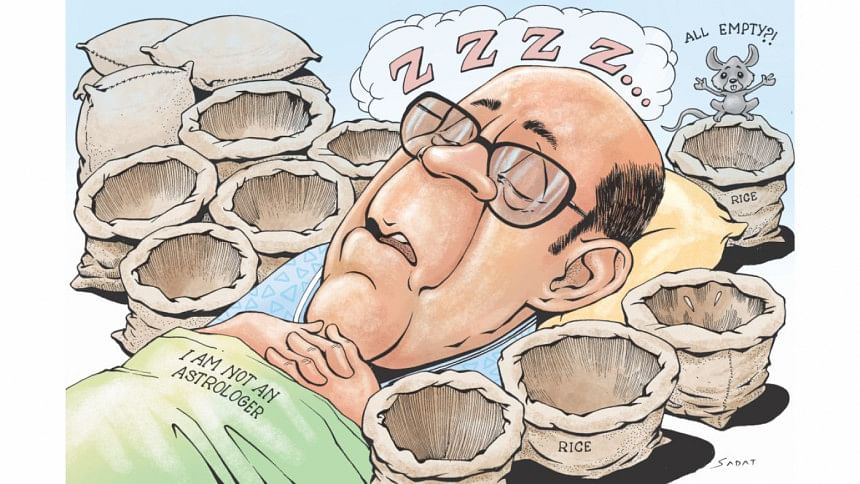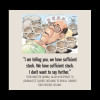Rice crisis catches Qamrul napping

This year's unusual hike in rice prices caught Food Minister Qamrul Islam napping.
Both Qamrul and the ministry he leads seemed ill prepared all along, but the minister has his own logic for that.
“I'm no astrologer,” he told The Daily Star, "How could I possibly anticipate that there would be such a devastating flood?"
He was, of course, referring to the flashfloods that washed away 10 lakh tonnes of Boro rice, the only rice Haor farmers grow in a year.
True, it was anyone's guess that flashfloods would strike the vast backswamp in the northeast as early as March.
But the writing was on the wall. If only Qamrul and his men could read and act accordingly!
Rice reserve in public granaries was on the slides and the staple's prices were shooting up since January. Policy think-tanks and the media had been persistent in sounding cautions against the free falling of food stock.
On top of the yearly food-aid programmes, the government initiated a new Tk 10-a-kg rice programme for 50 lakh ultra poor in late 2016. Qamrul's ministry distributed over seven lakh tonnes of rice from the government silos under this new programme, dubbing it as the prime minister's “Branding Programme” but never making any effort to replenish the fast depleting stock.
It didn't occur to the food ministry that it has to either locally procure or import rice to refill the granaries. It didn't also pursue policy measures, such as duty cuts on import, which would encourage private procurement from global market. The duty on rice import was 28 percent at the time, discouraging private importers from procuring the staple from international market.
Ultimately, the market forces came into play in a nasty way, with private traders and rice millers finding the moment ripe to go for a windfall through price hike.
Qamrul eventually moved to import rice, but it was too late. Already, prices of rice, especially the coarse ones consumed by the poor, hit a 47 percent increase on year-on-year basis.
It remains a riddle why the food ministry allowed the year-end food stock to dip below five lakh tonnes (in June FY2017) whereas the rice stock was nine lakh tonnes in FY2016, 13 lakh tonnes in FY2015 and over 10 lakh tonnes in the two preceding years.
With the government having so poor a stock and the early flashfloods destroying much of the Haor's Boro output, the predominantly private sector-led grain market seized the opportunity, much to the agony of low-income consumers.
"We had three lakh tonnes of rice in hand in April and I thought we'll be able to replenish the stock by a good Boro purchase during May-June. But that didn't happen. That's why we're now importing rice to stabilise the market," Qamrul told this paper.
But he never explained what stopped his ministry and the food department from early import when it was clear that food stock had already dipped to a six-year low.
Private sector import almost came to a grinding halt due to government foot-dragging on relaxing the heavy import duty slapped in FY2014-15. Only on June 20, the duty was cut down to 10 percent, facilitating late entry of some relatively cheap rice from India.
Because of the delay in making the import decision, the government now has to pay more as rice prices on international market have gone up in the past two months.
In May, the food department could get 1 lakh tonnes of rice at Tk 346.24 crore. But in June, the government imported 2.5 lakh tonnes of rice for Tk 908.85 crore from Vietnam.
The government is now considering importing rice from Thailand, where export prices of white rice rose by 10 percent, the highest since August 2014, according to the Thailand Trade Commission.
This means, the government will have to commit more money when it strikes a deal, expected next week, to import Thai rice.
Back in April, the Centre for Policy Dialogue (CPD) had cautioned the government: "Rising food inflation since January 2017 needs to be closely monitored in view of its adverse effect on the poorer households. Rising rice price in recent months in the backdrop of declining public stock appears to be the major cause that is pushing food inflation upward. At present, coarse rice price is about 24 percent higher than a year ago. Also, average rice price in Bangladesh is about 27.9 percent higher than that in India."
The country's leading independent think-tank also observed that "Curiously, distribution of rice and wheat saw a strong growth (12.3 per cent) in the backdrop of the decline in import, procurement and stock figures."
The thought of low food stock occurred to the food ministry only in June when, for the first time, Qamrul acknowledged before parliament that the government's rice stock was indeed low. He then said the process to import six lakh tonnes of rice was underway.
Data point to a negative correlation between stock and price. Coarse rice was selling below Tk 31 a kg when stock was 10 lakh tonnes. But it shot up to Tk 35 as the stock slipped below 10 lakh tonnes, to Tk 39 when it slid below eight lakh tonnes and to Tk 43 as the stock dipped below six lakh tonnes.
Agricultural economist Jahangir Alam told The Daily Star that although some rice was lost in the Haor flashfloods, the price should not have jumped so high. He questioned why the government allowed its rice stock to deplete in the first place.
"Why have they [food ministry and food directorate] failed to keep the minimum security stock of rice in the granaries?” said Ilahi Dad Khan, former director of the food directorate who had a crucial crisis management role during the 2007-08 global economic meltdown and the 2011 rice shortage.
“They should have noticed well in advance that how fast the food godowns were drying up due to continuous operations of open market sale (OMS) since January and exhausting of stock through distributions under the Tk 10/per kg rice distribution programme.”
During his time in the food directorate, there was always an effort to keep one million tonnes of food (rice and wheat) stock reserve in the godowns, he said.
Dr AMM Shawkat Ali, former caretaker government adviser who was agriculture secretary in late 1990s, said the government should have allowed private traders to import rice by reducing the high duty much earlier.
“What took the government so long to go for the duty cut?” he wondered.
Director General of Bangladesh Institute of Development Studies (BIDS) Dr KAS Murshid noted the food ministry should have moved fast to replenish stock when they were releasing rice in big volume for distribution among the ultra poor at Tk 10/kg.
But this is not the first time that Qamrul and his ministry acted late.
About two years ago, when wheat stock dried up in government silos, the food department hurriedly imported over two lakh tonnes of substandard wheat from a new market -- Brazil.
The grain quality and insect infestation sparked a huge outcry across the country. Even ruling Awami League men put up barricades at places, blocking entry of the consignments into public granaries. Later, the minister had to declare in parliament that they would not import wheat from Brazil any more and acknowledged that "the wheat looks bad."
In the very next domestic wheat growing season, Bangladesh experienced, for the first time in Asia, blast (fungal disease) in wheat. That caused a huge crop loss in wheat and scientists later confirmed the emergence of wheat blast in Bangladesh was caused by a South American lineage of fungus.
The government never investigated if there was any direct link between the import from Brazil and the blast attack, but among the scientific fraternity there is a strong suspicion that there is.

 For all latest news, follow The Daily Star's Google News channel.
For all latest news, follow The Daily Star's Google News channel. 








Comments